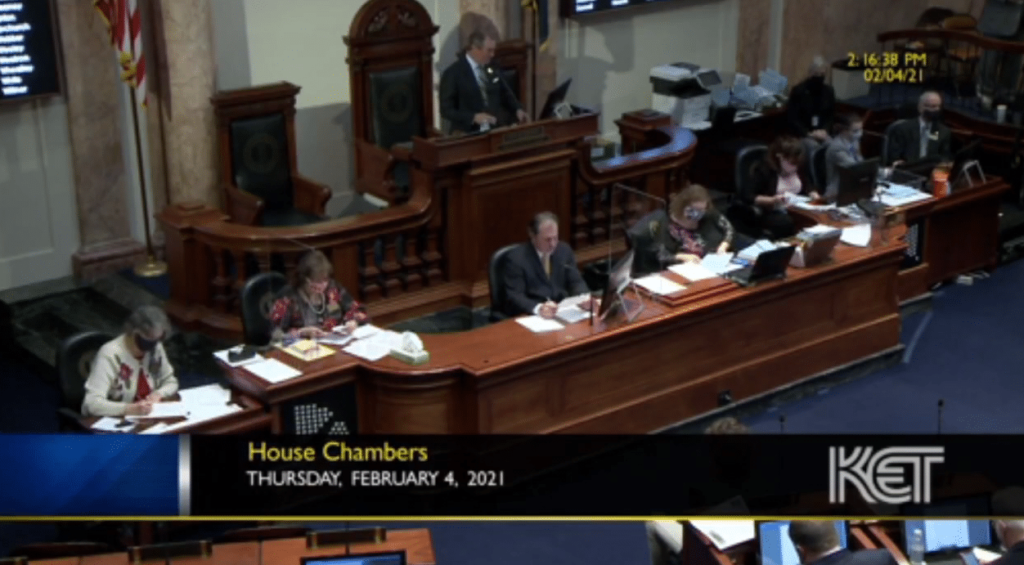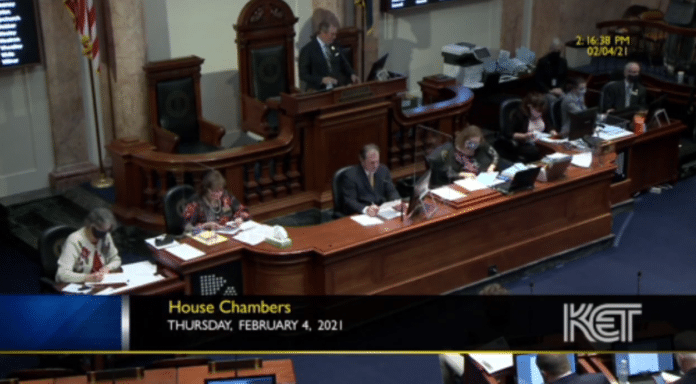FRANKFORT, Ky. (ABC 36) Kentucky lawmakers debated on House Bill 258 for over an hour on Thursday.
The bill would require teachers hired in 2022 to work longer and contribute more to their pensions.
“The outcome of this bill would do this, over a 30 year actuary period, it would save the commonwealth approximately 3.57 billion dollars” said Republican Representative, C. Ed Massey of Northern Kentucky, who is a sponsor for the bill.
Massey says it won’t fix the pension system’s $16 billion gap…but it’ll help.
“It basically stops the bleeding or reduces the hemorrhaging of money that has continued to grow and will continue to grow over the next couple years.”
The bill wouldn’t affect current teachers enrolled in the retirement system.
But new teachers would be offered a “foundational benefit”…that they’d have to contribute 9% of pay towards…and a “supplemental benefit” they’d contribute 2% towards.
And instead of retiring in 27 years, new hires would have to work 30 years to be eligible for benefits.
“What this bill does is presents potential new hires with something they can count on that they know will be fully funded” said Massey.
But some organizations are not for this bill.
Kentucky Education Association member and District President for the Kentucky Education Support Professionals Association, Doug Botkin says he thinks it’ll make it harder to hire good teachers.
“When you already have a shortage anyways and then you tell them they’re not going to get the retirement their predecessors got and they’re going to have to work longer to an older age…those are just not factors that make you want to, want to get into the profession.”
A statement from KEA President Eddie Campbell regarding HB258:
“KEA’s long standing and basic position on TRS – and indeed, on all public pensions — is that the existing defined benefit systems work now and will continue to work into the future if they are consistently and appropriately funded. Any financial system will break if its underlying assumptions about deposits are not met. Educators are deeply invested in their communities and are proud of their professions. They want a system that will recruit and retain the best and the brightest to educate the next generation.
“Educators are concerned that HB258 will discourage well-qualified new educators from seeking jobs in Kentucky, because it will be, in effect, a pay and benefits cut when compared to their more experienced colleagues. Should this bill become law, any teacher hired under its provisions will have to work longer and pay more for a lower guaranteed defined benefit upon retirement.
“Like many other states, Kentucky is in the throes of an educator shortage. That is real. And instead of addressing that problem by trying to make the profession more attractive, we are here today discussing a pension reform bill that will most likely reduce retirement benefits for future hires. We should be having conversations about increasing educator pay but, unfortunately for our educators and their students, we are not.
“We should be talking about how to support new educators with paid professional development, experienced mentors, and fully resourced classrooms, but we aren’t talking about any of that, either. Those are the conversations we should be having. If changes are made that will decrease benefits available to new hires under TRS, they must not stand alone; they must be part of a comprehensive package that increases new educator pay, fully funds public schools, and takes a more balanced approach to the needs of Kentucky public school students.”
The Kentucky 120 United group provided ABC 36 with a statement of their own.
“Today is a sad day for education in Kentucky. Teacher shortages will grow, because Frankfort has once again proven that public education and teachers are unimportant to them. They do not care about the viability of a work force that literally builds the future of the commonwealth every day in the lit classrooms. They care about taking every penny they can from teachers and then some. We are disappointed but not surprised.”
The bill passed 68 to 28 and moves to the Senate for consideration next.
The KY House just passed a bill that would change the pension system for NEW HIRES only. Still has to go to Senate. The KEA worries it’ll make it even harder to attract qualified candidates. @KaitlynShiveTV will explain the bill and the opinions tonight on ABC 36 News at 11.
— Veronica Jean Seltzer (@VJS_ABC36) February 4, 2021


